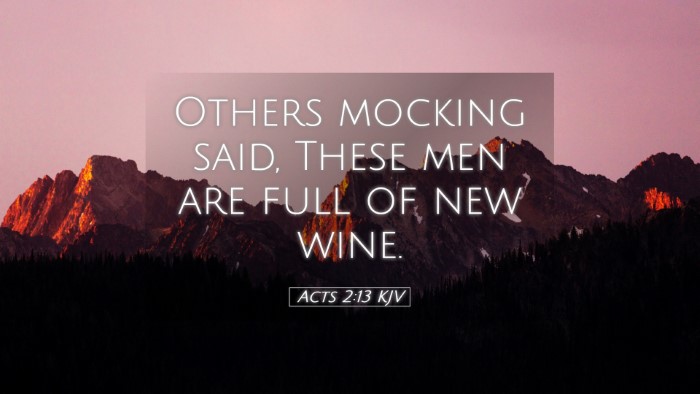Commentary on Acts 2:13
Verse Context: Acts 2:13 states, "Others mocking said, These men are full of new wine." This statement occurs during the Pentecost, a significant event in early Christian history when the Holy Spirit descended upon the apostles, enabling them to speak in various tongues. This verse captures the initial reaction of onlookers to the phenomena they witnessed among the disciples.
Overview of Commentary Insights
This commentary blends insights from Matthew Henry, Albert Barnes, and Adam Clarke, delving into the implications of this mocking response while exploring the broader theological significance of the Pentecost event.
1. The Context of Mockery
In this passage, the mocking by some bystanders highlights the divided response to the outpouring of the Holy Spirit. While some are in awe, others resort to dismissive and derisive comments.
- Matthew Henry's Insight: Henry emphasizes that mockery often arises from a lack of understanding. The bystanders, witnessing an act of divine intervention, were unable to comprehend the significance of what was happening. Their response exposes a common human tendency to ridicule that which we do not understand.
- Albert Barnes's Perspective: Barnes views this mockery as an insightful reflection on human nature. He points out that rather than seeking to understand the work of God, the mockers chose to belittle it. This underlines the conflict between spiritual insight and worldly perception.
- Adam Clarke's Commentary: Clarke notes that the accusation of drunkenness illustrates a profound misunderstanding of spiritual phenomena. He contextualizes the reaction by highlighting societal prejudices against religious fervor, whereby zeal and enthusiasm are often misinterpreted through worldly lenses.
2. Implications of Being "Full of New Wine"
This phrase is significant and ripe with meaning, reflecting both a literal and metaphorical interpretation regarding spiritual intoxication and the workings of the Spirit.
- The Contrast with Spiritual Fulfillment: The mockers attributed the apostles' behavior to drunkenness, failing to recognize that they were, in fact, filled with the Holy Spirit. This highlights a stark contrast between earthly intoxication and divine empowerment.
- Sociocultural Commentary: Elizabethans and later societies viewed drinking as a social vice, associating inebriation with loss of control. The accusation against the apostles not only served to undermine their message but also mirrored societal attitudes toward religious zeal. Henry points out that they were, in effect, trying to discredit a miraculous event by tying it to a social stigma.
3. Theology of Mockery and Skepticism
This verse opens a window into the theological implications of skepticism towards divine actions. The response of the crowd reflects a broader narrative present throughout the Scriptures where human reception of divine truth is often met with skepticism.
- Matthew Henry: Henry articulates that mockery does not negate the authenticity of divine action. He suggests that such responses demonstrate the resistance of the unregenerate heart to spiritual truths. God's work often challenges human wisdom and societal norms, provoking both belief and disbelief.
- Albert Barnes: Barnes discusses the division in responses to the miraculous, noting that such skepticism stems from a spiritual blindness. Mockery is portrayed as a shield that protects individuals from facing the deeper implications of their spiritual condition.
- Adam Clarke: Clarke connects this mockery to the larger theme of prophetic ministry, where messengers of God are often met with disdain. He highlights that those who are filled with the Spirit may face similar skepticism, but they must remain steadfast in their witness despite the ridicule.
4. Lessons for Contemporary Believers
Acts 2:13 serves as a poignant reminder of the ongoing struggles faced by believers in a skeptical world. The church today can draw several lessons from this encounter:
- Understanding Mockery: Believers should not be disheartened by mockery or disbelief. The early church faced ridicule, yet they continued boldly proclaiming the truth of the Gospel.
- Embracing Spiritual Boldness: The apostles’ boldness to publicly express their spiritual experiences invites contemporary Christians to embrace their faith passionately, regardless of societal perceptions.
- Seeking Understanding: The mocking crowd provides a cautionary tale about the importance of seeking truth and understanding rather than responding with prejudice. In a culture increasingly skeptical of Christianity, believers are encouraged to engage with seekers compassionately and thoughtfully.
Conclusion
Acts 2:13 serves not merely as a historical account but as an essential teaching moment for believers throughout the ages. The interplay of faith and skepticism exemplified in this verse challenges contemporary followers of Christ to engage actively with both the Spirit’s work in their lives and the world’s response to it. Drawing from the insights of revered commentators like Matthew Henry, Albert Barnes, and Adam Clarke, one can glean a richer understanding of the complexities tied to this pivotal moment in church history.


